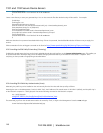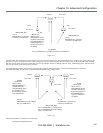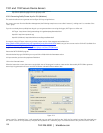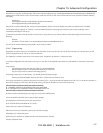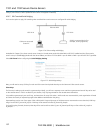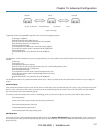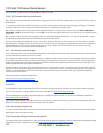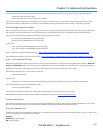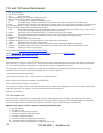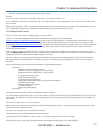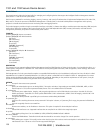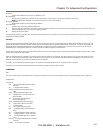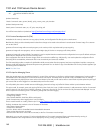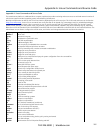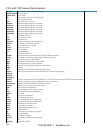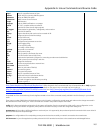
1101 and 1102 Secure Device Servers
724-746-5500 | blackbox.com
156
Options
-1, --on Power ON targets.
-0, --off Power OFF targets.
-c, --cycle Power cycle targets.
-r, --reset Assert hardware reset for targets (if implemented by RPC).
-f, --flash Turn beacon ON for targets (if implemented by RPC).
-u, --unflash Turn beacon OFF for targets (if implemented by RPC).
-l, --list List available targets. If possible, output will be compressed into a host range (see TARGET SPECIFICATION below).
-q, --query Query plug status of targets. If none specified, query all targets. Status is not cached; each time this option is used, powermand
queries the appropriate RPC's. Targets connected to RPC's that could not be contacted (e.g. due to network failure) are reported as status
"unknown". If possible, output will be compressed into host ranges.
-n, --node Query node power status of targets (if implemented by RPC). If no targets specified, query all targets. In this context, a node in
the OFF state could be ON at the plug but operating in standby power mode.
-b, --beacon Query beacon status (if implemented by RPC). If no targets are specified, query all targets.
-t, --temp Query node temperature (if implemented by RPC). If no targets are specified, query all targets. Temperature information is not
interpreted by powerman and is reported as received from the RPC on one line per target, prefixed by target name.
-h, --help Display option summary.
-L, --license Show powerman license information.
-d, --destination host[:port] Connect to a powerman daemon on non-default host and optionally port.
-V, --version Display the powerman version number and exit.
-D, --device Displays RPC status information. If targets are specified, only RPC's matching the target list are displayed.
-T, --telemetry Causes RPC telemetry information to be displayed as commands are processed. Useful for debugging device scripts.
-x, --exprange Expand host ranges in query responses.
For more details refer
Also refer
() documentation and
(
)
Target Specification
powerman target hostnames may be specified as comma separated or space separated hostnames or host ranges. Host ranges are of the general
form: prefix[n-m,l-k,...], where n < m and l < k, etc., This form should not be confused with regular expression character classes (also denoted by
''[]''). For example, foo[19] does not represent foo1 or foo9, but rather represents a degenerate range: foo19.
This range syntax is meant only as a convenience on clusters with a prefix NN naming convention and specification of ranges should not be
considered necessary—the list foo1,foo9 could be specified as such, or by the range foo[1,9].
Some examples of powerman targets follows.
Power on hosts bar,baz,foo01,foo02,...,foo05: powerman --on bar baz foo[01-05]
Power on hosts bar,foo7,foo9,foo10: powerman --on bar,foo[7,9-10]
Power on foo0,foo4,foo5: powerman --on foo[0,4-5]
As a reminder to the reader, some shells will interpret brackets ([ and ]) for pattern matching. Depending on your shell, you might need to enclose
ranged lists within quotes. For example, in tcsh, the last example above should be executed as:
powerman --on "foo[0,4-5]"
The pmpower utility is a high level tool for manipulating remote preconfigured power devices connected to the console server via a serial or
network connection. The PDU UPS and IPMI power devices are variously controlled using the open source PowerMan, IPMItool, or Network UPS
Tools, and Black Box’s pmpower utility arches over these tools so the devices can be controlled through one command line:
pmpower [-?h] [-l device | -r host] [-o outlet] [-u username] [-p password] action
-?/-h This help message.
-l The serial port to use.
-o The outlet on the power target to apply to
-r The remote host address for the power target
-u Override the configured username
-p Override the configured password
on This action switches the specified device or outlet(s) on
off This action switches the specified device or outlet(s) off
cycle This action switches the specified device or outlet(s) off and on again



